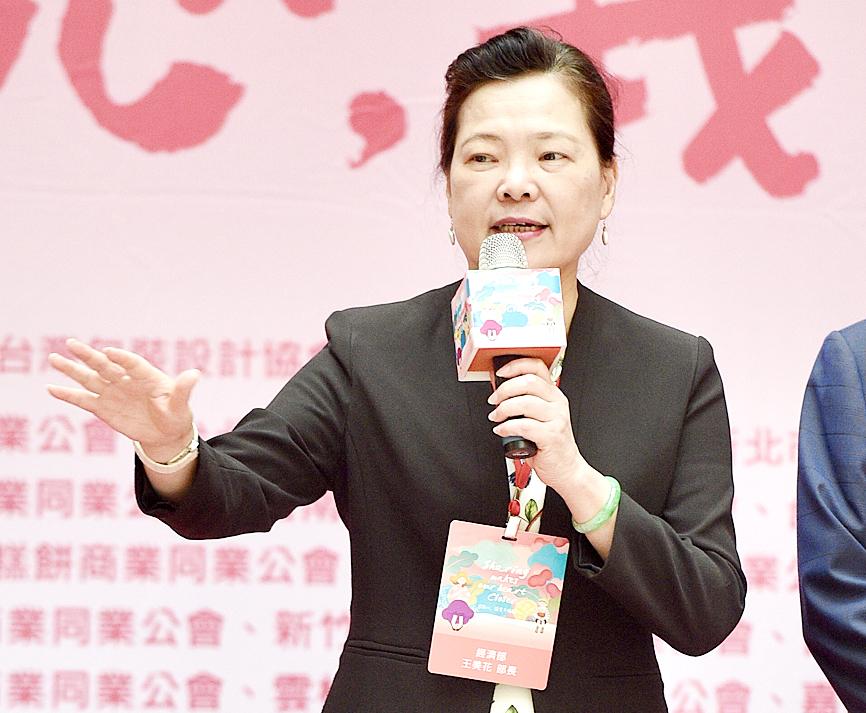The government is considering expanding its stimulus initiative for local industries affected by the COVID-19 pandemic, and its so-called “Stimulus 3.0” program is on the way, Minister of Economic Affairs Wang Mei-hua (王美花) said yesterday.
In a radio interview with Clara Chou (周玉蔻), Wang said the Executive Yuan is to finalize plans for another round of stimulus funds next week, before sending them to the Legislative Yuan for approval.
The government has already spent NT$200 billion (US$6.8 million) helping firms combat the COVID-19-related slowdown.

Photo: Peter Lo, Taipei Times
As the funds for the “Stimulus 2.0” program ran out early, the ministry on Wednesday terminated its relief programs rather than running them until the end of the month as planned.
Stimulus 3.0 is likely to add another NT$200 billion of relief, which would be allocated to support Taiwanese businesses hardest hit by COVID-19, mostly in the manufacturing sector, Wang said.
Companies whose revenue has decreased by 50 percent would be eligible for government assistance with employee wages and operating expenses, she added.
The exact details of the plan are to be discussed at the Executive Yuan, she said.
Although Taiwan is emerging largely unscathed from the pandemic compared with other nations, many sectors have still been heavily affected, Wang said.
“Orders in the traditional manufacturing sector such as textile and heavy machinery industries have dried up severely,” she said.
On the bright side, the service sector has recovered and no longer requires government stimulus, while some high-tech manufacturers have actually benefited from increased demand for work-from-home or distance learning devices worldwide, Wang said.
Separately, people have claimed nearly 6.7 million vouchers as part of the government’s Triple Stimulus Voucher program, which started on Wednesday, with 1.73 million claimed electronically, the ministry’s data showed.
The vouchers can be spent like cash until the end of the year, but cannot be exchanged for cash as they are meant to stimulate the economy rather than contribute to savings, the ministry said.
Businesses can take the vouchers to banks or post offices to exchange them starting from Thursday next week, it said.

Sweeping policy changes under US Secretary of Health and Human Services Robert F. Kennedy Jr are having a chilling effect on vaccine makers as anti-vaccine rhetoric has turned into concrete changes in inoculation schedules and recommendations, investors and executives said. The administration of US President Donald Trump has in the past year upended vaccine recommendations, with the country last month ending its longstanding guidance that all children receive inoculations against flu, hepatitis A and other diseases. The unprecedented changes have led to diminished vaccine usage, hurt the investment case for some biotechs, and created a drag that would likely dent revenues and

Global semiconductor stocks advanced yesterday, as comments by Nvidia Corp chief executive officer Jensen Huang (黃仁勳) at Davos, Switzerland, helped reinforce investor enthusiasm for artificial intelligence (AI). Samsung Electronics Co gained as much as 5 percent to an all-time high, helping drive South Korea’s benchmark KOSPI above 5,000 for the first time. That came after the Philadelphia Semiconductor Index rose more than 3 percent to a fresh record on Wednesday, with a boost from Nvidia. The gains came amid broad risk-on trade after US President Donald Trump withdrew his threat of tariffs on some European nations over backing for Greenland. Huang further

Nvidia Corp’s GB300 platform is expected to account for 70 to 80 percent of global artificial intelligence (AI) server rack shipments this year, while adoption of its next-generation Vera Rubin 200 platform is to gradually gain momentum after the third quarter of the year, TrendForce Corp (集邦科技) said. Servers based on Nvidia’s GB300 chips entered mass production last quarter and they are expected to become the mainstay models for Taiwanese server manufacturers this year, Trendforce analyst Frank Kung (龔明德) said in an interview. This year is expected to be a breakout year for AI servers based on a variety of chips, as

HSBC Bank Taiwan Ltd (匯豐台灣商銀) and the Taiwan High Prosecutors Office recently signed a memorandum of understanding (MOU) to enhance cooperation on the suspicious transaction analysis mechanism. This landmark agreement makes HSBC the first foreign bank in Taiwan to establish such a partnership with the High Prosecutors Office, underscoring its commitment to active anti-fraud initiatives, financial inclusion, and the “Treating Customers Fairly” principle. Through this deep public-private collaboration, both parties aim to co-create a secure financial ecosystem via early warning detection and precise fraud prevention technologies. At the signing ceremony, HSBC Taiwan CEO and head of banking Adam Chen (陳志堅)